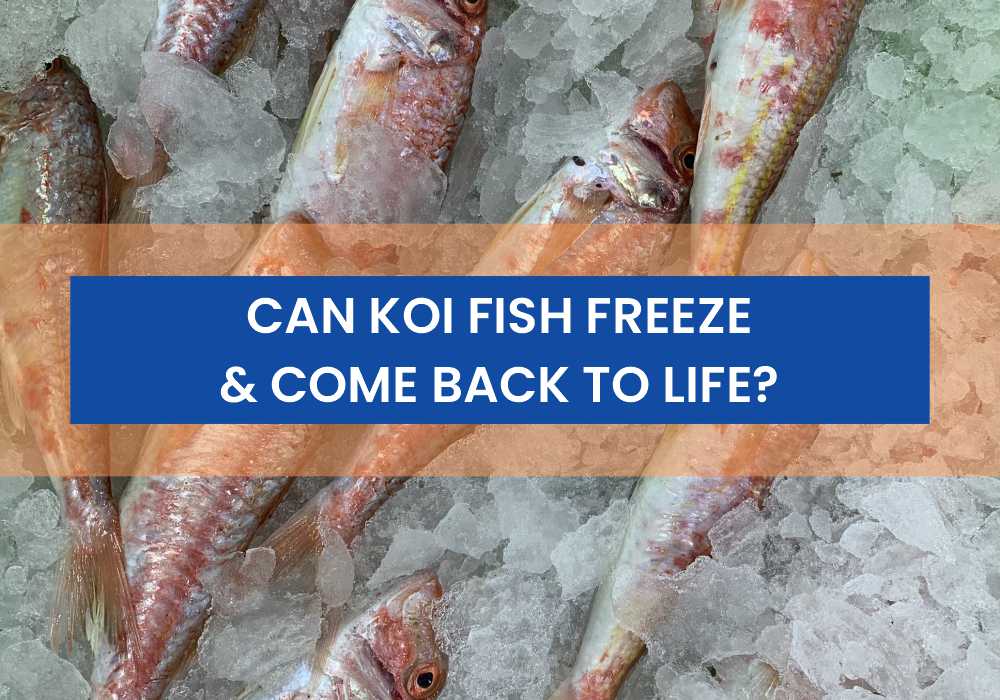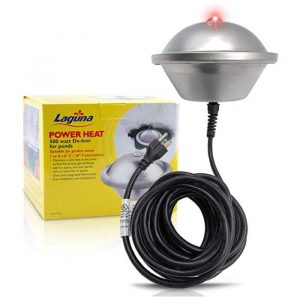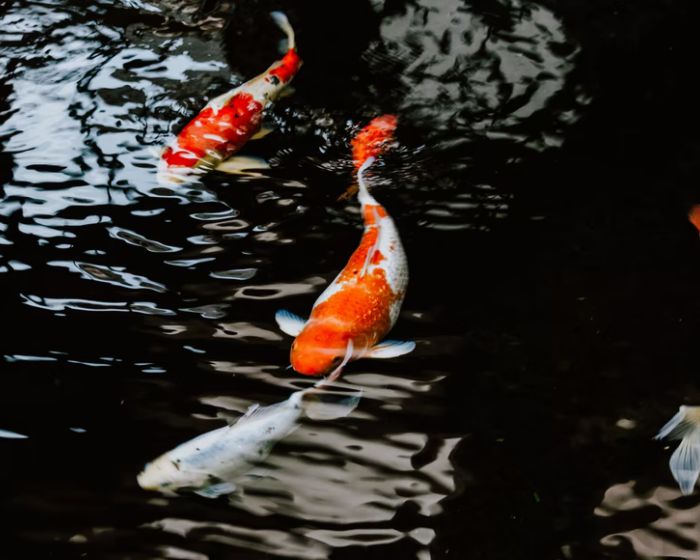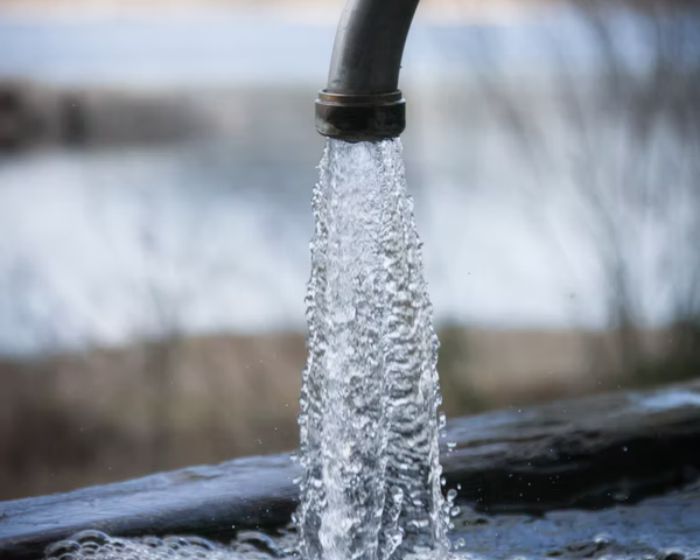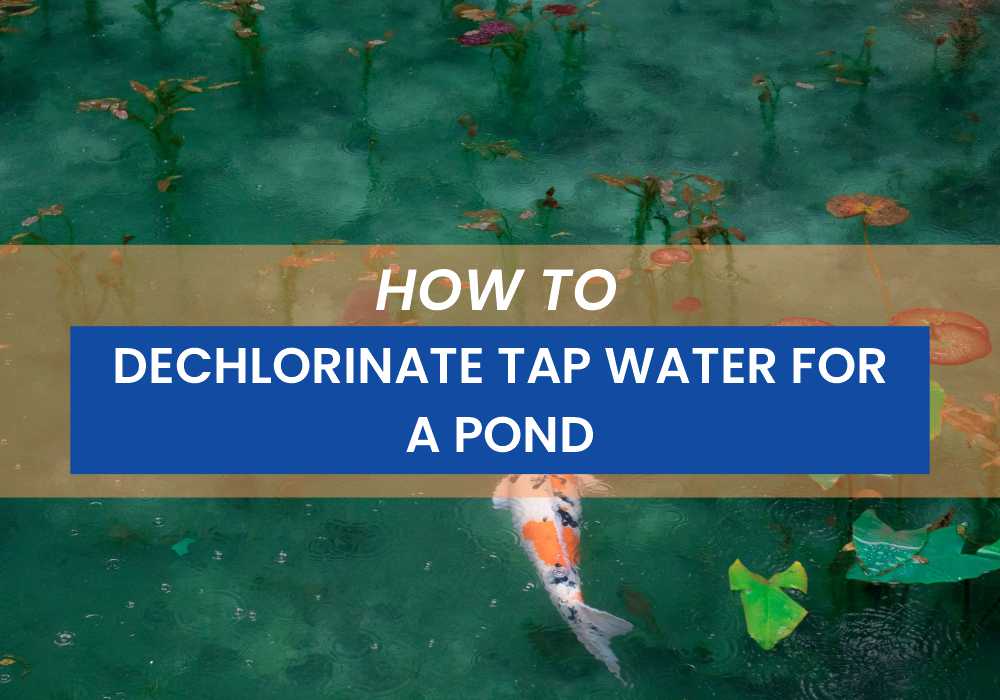As an Affiliate, We may earn a commission that doesn't cost you extra from qualifying purchases using links in this post. It helps keeps this blog running.
Koi fish is one of the most popular types of ornamental fish in Japan. Awareness of this type of pond fish originated from Kawanabe Kohachiro, a Japanese koi breeder. He was the one who began to breed koi as pond fish and then sold them during a local exposition in 1885. The koi fish became very popular from that point on and they started being exported to other countries as well.
In Japan, koi is a symbol of strength and perseverance in the face of adversity. This is the reason why koi is such a popular type of ornamental fish.
One thing that koi owners usually want to know about koi is whether or not koi can freeze solid and then come back to life if it thaws. This wonder has been the subject of many discussions which will be thoroughly explained in the article.
How Cold Can Koi Survive?
Koi fish can survive water temperatures down to about 36 degrees Fahrenheit. At this point, the koi’s metabolism will start to slow down and they will become less active. The koi will stop eating and their immune system will become weaker. If the water temperature drops any lower, the koi may go into hibernation or they may die.
Koi are cold-blooded animals, so their body temperature is the same as the water they are in. In the wild, koi will move to different areas of a pond or lake to find water that is the right temperature for them. In captivity, it is important to provide koi with a pond or tank that has a consistent water temperature.
Do Koi Fish Freeze In The Winter?
Yes, koi fish can and will freeze in winter if the water in their pond gets cold enough. Ice can form on the surface of the water and make it difficult for the koi to breathe. In severe cases, the fish may die from being frozen due to exposure to the extreme cold temperature.
To prevent this from happening, you need to take steps to insulate your koi pond and keep the water warm enough for the fish to survive. This can be done by using a pond heater or by covering the pond with a tarp or blanket. You also need to make sure that there is no way for the water to freeze over completely, as this will kill the koi.
If you live in an area where winter temperatures are extreme, it may be best to bring your koi indoors during the coldest months. This can be done by setting up a temporary pond in a garage or basement. You will need to provide a filtration system and a heater to keep the water warm enough for the fish.
Taking these steps will ensure that your koi are safe and healthy during the winter months.
How Do Koi Survive The Winter?
When the water temperature starts to drop in the fall, koi fish will begin to prepare for winter. They will start to eat more food so they can build up their body fat reserves. This extra body fat will help them stay warm and keep their energy levels up during the winter months which is a very brilliant and unique adaptation.
As the water temperature continues to drop, koi will become less active. They may even stop eating altogether. This is normal and nothing to worry about. Your koi are just conserving their energy so they can survive the winter.
When the water freezes over in winter, koi fish will go into a survival state of torpor which is a semi-hibernation. In this state, their metabolism will slow down and they will stop growing. They will remain in this state until the water starts to warm up again in the spring.
Koi fish are very hardy creatures and can survive even the harshest winters. As long as you provide them with a properly heated pond, they will be just fine.
Can koi fish freeze and come back to life?
If you are wondering how long can a koi fish stay frozen and come back to life, then No, Koi fish cannot be frozen dead and come back to life. Koi fish are cold-blooded animals, just like frogs and other types of amphibians. This means that koi can persevere when exposed to subzero water temperatures but koi will die if the fish itself becomes frozen.
Koi can be acclimated to water temperature as low as 2 degrees Celsius or 36 degrees Fahrenheit, but they cannot survive in cold water temperatures of 0 degrees Celsius or 32 degrees Fahrenheit.
This is because the koi’s body does not have the necessary enzymes that would allow koi to convert their glycogen stores into glucose. This process, which is known as anaerobic glycolysis, is very important for koi because it allows them to tolerate low oxygen content and low water temperatures. This is the reason why koi fish close their mouths and stop moving when the koi pond’s water temperature begins to drop rapidly.
Koi can also survive cold winter weather and even freezing water because koi have a very special adaptation that enables koi to live in colder waters: koi produce large quantities of glycerol when koi begin to freeze. This type of adaptation is very rare among fish and it allows koi fish survive freezing water temperatures until the koi fish pond warms up.
An alternative way for koi to come back to life is that koi can be taken inside a warm house or an unheated garage and koi will slowly increase their body temperature. This way koi can transition from a frozen koi fish to a koi that is active and playful again.
Koi fish are very hardy animals, especially Kohaku koi fish. Kohaku koi fish have been bred for hundreds of years because Kohaku koi are usually the koi fish that are chosen to represent koi at koi expositions. This koi breed is very strong, Kohaku koi are able to survive cold water temperature and even freezing temperatures.
How do I keep my koi fish pond from freezing in the winter?
Keeping your koi fish pond from freezing is not a very difficult task. In fact, koi fish owners have been overwintering koi in their ponds for centuries without major problems.
To keep koi fish pond from freezing in the winter, all koi owners need to have the following 6 things in place:
1) Drainage System.
This means that koi fish ponds need to have a koi pond pump and koi pond pipes which will allow koi owners to drain their ponds in case they freeze up completely. This koi pond freeze prevention method is very important because koi ponds are usually shallow, which means that koi ponds are at risk of freezing faster than koi ponds with deeper waters.
2) Insulation
A koi fish pond blanket or koi pond insulation tube can also be used to insulate your fish pond.
The koi pond insulation tube allows koi owners to insulate koi ponds without too much trouble. The koi fish blanket works just like the koi pond insulation tube, but koi fish blankets are easier to install because koi fish covers can simply be laid on top of your koi pond.
3) Koi Pond Heaters
Heaters can be used to help maintain a consistent water temperature for your koi. It is important to get a heater that is the right size for your pond or tank. A good idea would be for koi owners to install a koi pond heater that is activated when the koi water temperature drops below certain cold temperatures. koi pond heaters are widely available at koi fish ponds supplies stores and can be easily installed in koi ponds if koi owners follow the pond heater instructions carefully.
Laguna PowerHeat Pond De-Icer
The recommended pond heater is the Laguna PowerHeat Pond De-Icer with an LED light that indicates when the machine has begun heating up the pond. It also helps release toxic gases from fish respiration and decomposing organic matter to escape. At the same time, it allows oxygen to re-enter the pond.
4) Relocate The Koi Fishes
Koifish should be relocated to an indoor koi tank for winter if the koi pond is not big enough for koi owners to dig channels in order to drain their koi ponds. Koi fish need at least 3 feet of depth in order koi fish to survive the winter. Koi are rather very hardy fish by koi standards, but they can still freeze in a frozen pond, and make no mistake, koi fish can freeze in koi ponds that have not been properly insulated.
5) Cover The Pond
A pond cover will help trap heat in the water and protect your koi from the cold air.
Covering your koi pond will help keep it from freezing during winter. This is because the cover will trap heat in the water, preventing it from dissipating. Since the water near the surface of a pond is warmer than the water at the bottom. So, when you cover the pond, it will help to reduce heat loss and keep your koi warm. Koi are cold-blooded fish, so they are particularly susceptible to changes in water temperature. A well-insulated cover will help maintain a consistent water temperature, keeping your koi healthy and happy.
6) Add Plants
Adding plants to your koi pond will help keep it from freezing during winter for a few reasons. First, plants release oxygen into the water which helps keep the water from freezing. Second, plants absorb sunlight and heat up the water around them. This can help prevent the entire pond from freezing over. Finally, having plants in your pond will provide some shelter for your fish if parts of the pond do freeze over. By adding plants to your koi pond, you will be helping to keep your fish safe and healthy all winter long.
So, in order for your koi fishes to survive the winter without freezing your koi pond, you will need to have a koi pond drainage system, koi pond insulation, koi pond heaters, koi fish relocation, cover the pond, and or add plants. If your koi ponds meet all these six koi fish winterizing requirements you should be able to keep your koi ponds open during the winter months with no problems.
What happens if my Koi Fish Pond Freezes?
As the fish pond ices over, koi fish can suffocate and die because there is no way for new oxygen to get to the fish. As the fishes breathe, they will use up all available oxygen in the water and when there is no new oxygen to replace the used ones, they will eventually suffocate and die after a while.
If your fish pond freezes completely and the fish are left under this thick sheet of ice, they will eventually asphyxiate. Fish use the oxygen that is dissolved in water to breathe, although fish can extract oxygen from an environment with little available oxygen if they have to because koi fish are cold-blooded it’s harder for them to extract oxygen from low-oxygen environments compared to fish who are warm-blooded, which is why fish are not found very deep in the ocean.
When fish release gases, they must have a means of escape, or their blood will become increasingly more concentrated with each subsequent breath and fish can die from what’s called acidosis or oxygen poisoning. When the fish pond freezes tightly over, it creates an anaerobic environment for fish because there is no way to discharge out the gaseous waste.
How Long Can Koi Fish Live In A Frozen Pond?
Koi fish can live and survive in a frozen pond for about 90 days. They can also survive all winter as long as the water is well aerated so they can breathe. They can even survive in ponds that are completely frozen over as long as there are large pockets of air bubbles trapped under the koi fish pond ice.
If koi do not have access to oxygenated koi pond water they will eventually die if their koi pond freeze solid.
How long can a Koi fish stay frozen and come back to life?
The truth is koi fish cannot be completely frozen and come back to life. A koi fish that has been truly completely frozen for more than 5 minutes will have died.
If a koi fish is yet to be completely frozen and quickly thawed properly, it may survive the ordeal. If not, it will most likely not live past being defrosted. This is because koi fish, like many other cold-blooded animals, freeze internally in the spaces around their cells.
Conclusion
So, koi fish can live and survive in koi ponds during the winter as long as koi owners make certain that their koi ponds have a koi pond drainage system, koi pond insulation, koi pond heaters, koi fish relocation, cover the pond, and or add plants. They also need to be aware of how much cold koi fish can survive in the pond.
So, koi fish winter survival is possible as long as koi owners meet the koi fish winterizing requirements and that koi pond should be at least 3 to 4 feet deep for koi fish to survive the freezing winter. Any koi pond with koi fish that are more than 4 inches long needs koi pond heaters.

I’m Akin Bouchard. Even though I now own several different fish species, I first became a koi pond owner because I loved these creatures and wanted to turn my passion into something more serious. I take pride in my collection of koi fish and love sharing my knowledge with others interested in these beautiful creatures.

